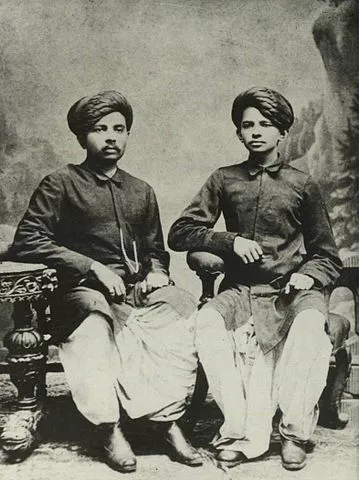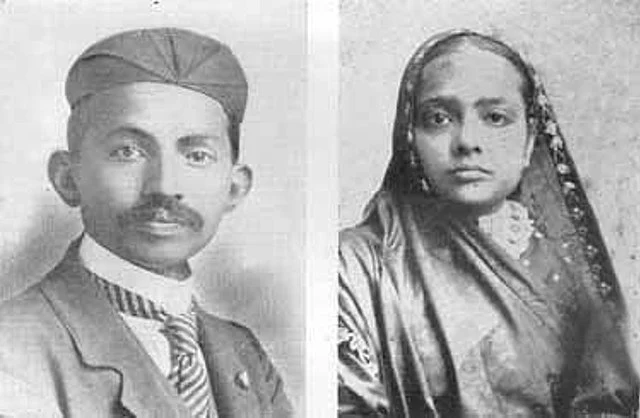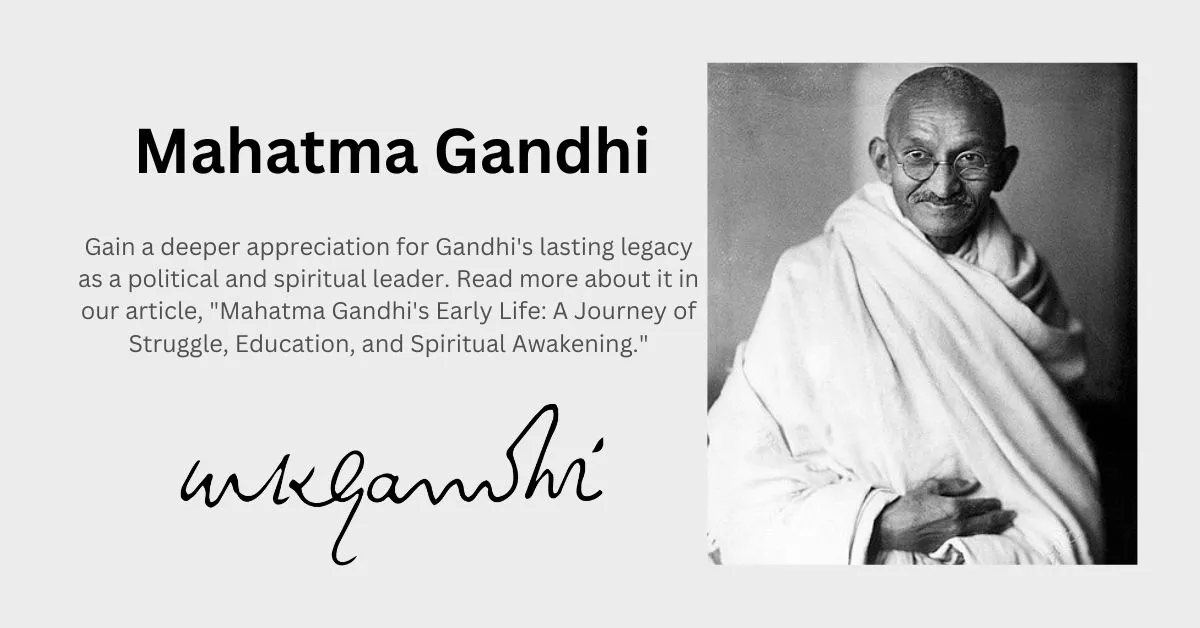Explore Mahatma Gandhi’s early life, from his birth and childhood to his education and personal experiences. Discover how his struggles, education, and spiritual influences shaped his political philosophy and approach to activism. Gain a deeper appreciation for Gandhi’s lasting legacy as a political and spiritual leader. Read more about it in our article, “Mahatma Gandhi’s Early Life: A Journey of Struggle, Education, and Spiritual Awakening.

Mahatma Gandhi, born on October 2, 1869, was a renowned Indian political leader, who played a crucial role in India’s independence struggle against the British Empire. He is also known for his philosophy of non-violence and civil disobedience, which inspired many other great leaders around the world. Understanding Mahatma Gandhi’s early life is important because it sheds light on the factors that shaped his beliefs, principles, and political ideology. His childhood, education, and personal experiences all played a significant role in shaping his worldview and his approach to political activism. By studying his early life, we can gain a deeper understanding of his legacy and his enduring impact on the world.
Be the change you want to see in the world.
– Mahatma Gandhi
Birth and Childhood Of Mahatma Gandhi
Mahatma Gandhi was born in Porbandar, a coastal town in Gujarat, India, on October 2, 1869, to Karamchand Gandhi and Putlibai Gandhi. His father was the Diwan (chief minister) of Porbandar, and his mother was a deeply religious and devout woman. Gandhi’s family belonged to the Modh Baniya caste, which was considered to be a relatively affluent and influential community in Gujarat.
Gandhi’s upbringing was marked by the influence of his mother, who instilled in him a strong sense of morality and spirituality. His family’s religious background, which was steeped in the Hindu and Jain traditions, also had a significant impact on his upbringing. He was a vegetarian from a young age, and his family’s adherence to these principles played a major role in shaping his views on non-violence and the sanctity of life.
Mahatma Gandhi’s early experiences, including his interactions with members of different communities, also had a significant impact on his worldview. For instance, he witnessed the oppression and discrimination faced by his father’s Muslim employees, which made him acutely aware of the injustices present in society. This experience, along with his mother’s teachings, would later shape his views on equality and justice.
Overall, Gandhi’s early life was characterized by a strong sense of morality, spirituality, and social consciousness, all of which played a significant role in shaping his political views and his approach to activism.
Educational Background
Mahatma Gandhi’s education began in his hometown of Porbandar, where he attended primary school. He then went on to attend high school in nearby Rajkot, where he excelled academically but struggled with shyness and social awkwardness.
After completing high school, Gandhi moved to England to pursue a degree in law. He faced significant challenges in adapting to life in a new country, including cultural differences and financial constraints. Despite these difficulties, he was able to complete his studies and was admitted to the bar in 1891.
While in England, Mahatma Gandhi was exposed to Western political and social ideologies, which would later have a significant impact on his political views. He was particularly influenced by the works of Henry David Thoreau, Leo Tolstoy, and John Ruskin, all of whom espoused ideas of non-violent resistance and social justice.
Despite his successful education and legal career, Gandhi’s experiences in England also gave him a sense of displacement and alienation, which would shape his views on the importance of self-sufficiency and community empowerment.
Mahatma Gandhi’s struggles with pursuing education were not limited to his time in England. After returning to India, he faced significant challenges in his attempts to practice law, including discrimination based on his race and ethnicity. These experiences led him to turn to political activism, and he eventually became one of India’s most important leaders in the struggle for independence.
Overall, Gandhi’s education was marked by both success and struggle. Despite facing numerous obstacles, he was able to overcome them and use his experiences to shape his political views and his approach to activism.
How was Mahatma Gandhi’s personal life?

Mahatma Gandhi’s personal life was characterized by his close relationship with his wife Kasturba, his family, and his deeply religious and spiritual convictions.
Gandhi married Kasturba when he was just 13 years old, in a marriage arranged by their parents. Despite the arranged nature of their union, the couple had a deep and enduring love for each other. Kasturba was a close collaborator in Gandhi’s political activism, and together they had four children.
Gandhi’s relationship with his family members was also very important to him. He was deeply influenced by his mother’s religious teachings and his father’s political leadership. He was also very close to his older brother, Laxmidas, who served as a mentor and guide throughout his life.
Religious and spiritual influences played a significant role in Gandhi’s personal life. He was a devout Hindu, but he was also influenced by other religious traditions, including Jainism, Christianity, and Islam. He believed in the importance of prayer and meditation as a means of achieving personal enlightenment and social transformation.
Overall, Gandhi’s personal life was characterized by his close relationships with his wife, family, and community, as well as his deeply religious and spiritual convictions.
Events that Shaped Mahatma Gandhi’s Early Life
Mahatma Gandhi’s early life was shaped by several significant events, including his experiences with racial discrimination in South Africa, his exposure to Western political and social ideologies, and the impact of Hinduism and Jainism on his beliefs.
Gandhi’s experience with racial discrimination in South Africa was a defining moment in his life. As a young lawyer, he faced numerous instances of prejudice and mistreatment due to his Indian heritage. These experiences led him to become a vocal advocate for the rights of Indians living in South Africa, and he began to develop his philosophy of non-violent resistance in response to the injustices he witnessed.
During his time in England, Gandhi was exposed to Western political and social ideologies that would have a significant impact on his political views. He was particularly influenced by the works of Henry David Thoreau, Leo Tolstoy, and John Ruskin, all of whom espoused ideas of non-violent resistance and social justice. These influences would later inform his approach to activism and his belief in the power of civil disobedience as a means of effecting social change.
Finally, Gandhi’s beliefs were also shaped by his deep connection to Hinduism and Jainism. He was influenced by the teachings of these religions, particularly the concept of ahimsa or non-violence, which became a cornerstone of his political philosophy. Gandhi believed that non-violence was not only a moral imperative, but also an effective means of achieving political and social change.
Overall, the events that shaped Gandhi’s early life were instrumental in shaping his political views and approach to activism. His experiences with discrimination, exposure to Western political and social ideologies, and connection to Hinduism and Jainism all played important roles in his development as a political leader and advocate for social justice.
Conclusion
Mahatma Gandhi’s early life was marked by significant events and influences that shaped his political philosophy and approach to activism. His experiences with racial discrimination in South Africa, exposure to Western political and social ideologies, and connection to Hinduism and Jainism all played important roles in his development as a political leader and advocate for social justice.
Understanding Gandhi’s early life is crucial for understanding his later political achievements and the impact of his philosophy of non-violent resistance on the world. It provides an important context for understanding the social, political, and cultural milieu in which he developed his ideas and activism.
In the next section of this article, we will discuss Gandhi’s role in India’s struggle for independence, his philosophy of non-violent resistance, and his lasting legacy as a political and spiritual leader.
In conclusion, Mahatma Gandhi’s early life provides important insights into his later political achievements and his philosophy of non-violent resistance. By understanding the events and influences that shaped his early life, we can gain a deeper appreciation for his legacy as a political and spiritual leader.
End Note: As we continue to explore Mahatma Gandhi’s life and legacy, it is important to remember the principles of non-violent resistance and social justice that he championed. These values continue to resonate today and provide a guide for those seeking to create positive change in the world.
Important FAQs
When and where was Mahatma Gandhi born?
Mahatma Gandhi was born on October 2, 1869, in Porbandar, a coastal town in present-day Gujarat, India.
What was Mahatma Gandhi’s family background?
Gandhi was born into a Hindu family of the Modh-Bania caste. His father, Karamchand Gandhi, was a government official, and his mother, Putlibai, was a deeply religious woman.
What education did Mahatma Gandhi receive?
Gandhi received primary and secondary education in India. He later went to England to study law and jurisprudence. He struggled with his studies and faced many challenges in pursuing his education.
Who was Kasturba, and how did Gandhi’s marriage to her impact his life?
Kasturba was Gandhi’s wife and lifelong companion. Their marriage was arranged when Gandhi was just 13 years old, and Kasturba was 14. She was a source of support and inspiration throughout his life.
How did Gandhi’s experiences with racial discrimination in South Africa impact his political philosophy?
Gandhi’s experiences with racial discrimination in South Africa led him to develop his philosophy of non-violent resistance, which he saw as a powerful tool for achieving social justice and political change.
Explore More Topics In History.
Admit Card Current Affairs History Indian Polity Mock Test Rajasthan job vacancy RAS application Form RAS Bharti RAS Recruitment 2023 Result Vacancy Yojana

